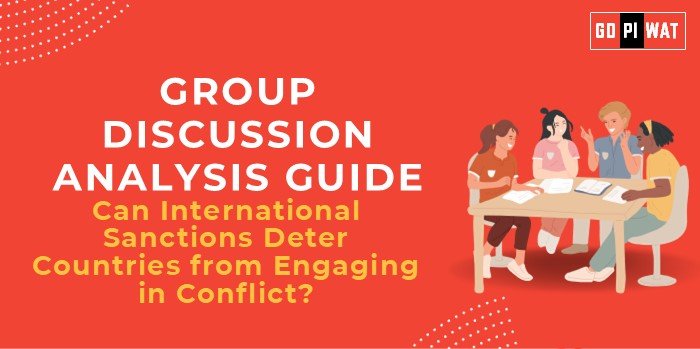📋 Group Discussion Analysis Guide: Can International Sanctions Deter Countries from Engaging in Conflict?
🌐 Introduction to the Topic
- 📌 Opening Context: In an increasingly globalized world, international sanctions have emerged as a critical tool for maintaining peace and order. Yet, their effectiveness in deterring conflicts remains a subject of intense debate, with recent geopolitical crises shedding light on their limitations and successes.
- 📖 Topic Background: Sanctions are non-military punitive measures imposed by countries or organizations to compel behavioral changes in nations or entities. Originating as diplomatic tools during the League of Nations era, sanctions have evolved in complexity, targeting sectors like trade, finance, and technology. Recent examples, such as sanctions against Russia after its invasion of Ukraine, illustrate their centrality in international diplomacy.
📊 Quick Facts and Key Statistics
🌍 Global Sanctions Cases: Over 30 active sanctions regimes globally (UN Sanctions Report, 2023).
📉 Economic Impact Example: Russia’s GDP dropped by 2.2% in 2022 due to sanctions (IMF).
⚠️ Humanitarian Consequences: Sanctions in Syria have impacted 90% of the population, limiting access to basic needs (UNICEF).
🛡️ Military Behavior: Countries under sanctions have a 20% lower likelihood of engaging in sustained conflicts compared to non-sanctioned states (Brookings Institution).
📉 Economic Impact Example: Russia’s GDP dropped by 2.2% in 2022 due to sanctions (IMF).
⚠️ Humanitarian Consequences: Sanctions in Syria have impacted 90% of the population, limiting access to basic needs (UNICEF).
🛡️ Military Behavior: Countries under sanctions have a 20% lower likelihood of engaging in sustained conflicts compared to non-sanctioned states (Brookings Institution).
👥 Stakeholders and Their Roles
- 🏛️ United Nations: Implements multilateral sanctions under the Security Council framework.
- 🌍 Sanction-Imposing Countries: Apply targeted measures, e.g., the U.S. and EU against North Korea or Russia.
- 📌 Target Nations: Often suffer economic and social strain, e.g., Iran and Venezuela.
- 🌱 International Organizations: Facilitate compliance and assess humanitarian impacts (e.g., Amnesty International).
🏆 Achievements and Challenges
✨ Achievements:
- ✅ Behavioral Modification: South Africa’s apartheid policies dismantled partly due to global sanctions.
- 📉 Economic Pressure: Iranian oil exports reduced by over 70% due to U.S. sanctions (2020).
- 🤝 Diplomatic Resolutions: Libya’s abandonment of nuclear ambitions following sanctions.
⚠️ Challenges:
- ⚠️ Humanitarian Impact: Severe repercussions on civilians, as seen in Yemen and North Korea.
- 🔄 Circumvention: Nations often find ways to evade sanctions (e.g., Russia-China trade).
- ❌ Efficacy Debate: Prolonged sanctions on Cuba failed to yield political changes.
🌍 Global Comparisons:
- ✔️ Effective Example: Sanctions against Iraq led to UN inspections of WMD programs.
- ❌ Ineffective Example: U.S. sanctions against Venezuela worsened economic crises without regime change.
Case Studies:
- 🌏 Russia-Ukraine Conflict: Extensive sanctions slowed but did not halt Russian aggression.
- ⚛️ North Korea: Sanctions limit economic growth but have not stopped nuclear proliferation.
📢 Structured Arguments for Discussion
- ✅ Supporting Stance: “Sanctions effectively pressure regimes to alter policies without resorting to armed conflict, exemplified by Libya’s denuclearization.”
- ❌ Opposing Stance: “Sanctions often disproportionately affect civilians and fail to achieve strategic objectives, as evident in Cuba.”
- ⚖️ Balanced Perspective: “While sanctions can deter conflicts in specific scenarios, their inconsistent application and humanitarian toll raise ethical and practical concerns.”
🧠 Effective Discussion Approaches
- 🎯 Opening Approaches:
- Quote an expert or statistic, e.g., “UN sanctions have contributed to conflict resolution in 40% of cases.”
- Pose a question: “Can sanctions alone create a lasting peace?”
- Use a case study: “Let’s examine Russia’s response to sanctions since 2022.”
- 🤝 Counter-Argument Handling:
- Recognize limitations but highlight successes: “Sanctions may not always work, but cases like South Africa show their potential.”
📊 Strategic Analysis of Strengths and Weaknesses
- Strengths: Non-violent, cost-effective for imposing nations, internationally collaborative.
- Weaknesses: Risk of civilian harm, potential for circumvention, inconsistent enforcement.
- Opportunities: Technological sanctions (cybersecurity), partnerships with neutral nations.
- Threats: Retaliatory measures, geopolitical polarization.
🎓 Connecting with B-School Applications
- 💼 Real-World Applications: Exploring sanctions’ economic impacts in project management or trade analysis.
- 📚 Sample Interview Questions:
- “Evaluate the effectiveness of sanctions in global conflict resolution.”
- “How can sanctions balance humanitarian concerns with political objectives?”
- 💡 Insights for Students:
- Examine cross-sectoral impacts of sanctions.
- Investigate new sanctioning mechanisms like cyber-restrictions.


